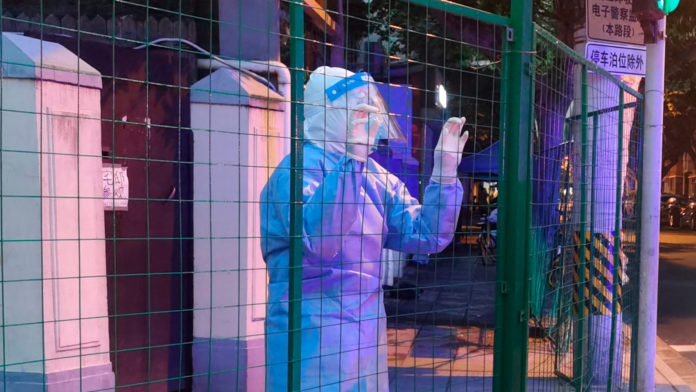
In spring of this year a severe lockdown in Shanghai garnered international attention. At the time Coda ran a piece about one man’s nail-biting escape from the city. Shanghai has started enforcing mass covid testing again, while other areas of the country are extending lockdowns, signaling the potential for the return of extreme restrictions.
But for some, namely migrant workers who took the brunt of the spring lockdown, the nightmare never ended.
On July 11 an article about a female migrant in Shanghai went viral on WeChat. Afen had arrived in the city just before the lockdown, and since recovering from Covid has been unable to find a job. Her experience is not uncommon, as many job listings on recruitment sites are now indicating that they will not hire people who have tested positive for Covid. Not just recently, but ever.
With no income, migrant workers are left with nowhere to go but the streets. The plight of Afen, and others like her, garnered widespread sympathy on social media. Even Chinese state media declared that “such practices are outrageous.”
But after two years of excessive restrictions under the state’s Zero-Covid policy, it is no surprise that employers are in a heightened state of panic. There is a realistic fear that just one covid positive employee could send entire teams and offices into isolation. Or even worse that a small cluster of covid positive employees could result in an entire city locking down.
Blame for this atmosphere of fear lies with an authoritarian state that has utilized technology in an unprecedented way in the name of tackling covid. Employers are only able to see which applicants have had covid because of a highly meticulous data collection process run by the state. A collection process that many fear is going beyond the bounds of covid prevention, further entrenching a system of extreme surveillance.
We also covered the issue of Chinese surveillance in this week’s Authoritarian Tech newsletter.
“The institutionalization of covid-prevention technologies is certainly one of the biggest concerns going forward,” Vincent Brussee, an analyst at the Mercator Institute for China Studies, told me over email. “And even if the health codes themselves are at some point disbanded, their underlying location tracking capabilities will almost certainly continue to be used in one form or another.”
Despite the state’s severe policies and repressive crackdowns on speech, examples of dissent have become common. For instance, residents in Beijing were recently allegedly asked to wear an electronic monitoring wristband while in quarantine.
The policy received significant pushback and negative commentary on Weibo, the popular Chinese equivalent to Twitter. City authorities later retrieved the wristbands and put out a statement saying they were not compulsory, leaving some to ponder whether the state had caved in the face of public pressure.
These are small acts of defiance, but they matter. Especially when they lead, however rarely, to tangible results and changes in policy.
IN GLOBAL NEWS
Heatwaves in Europe have been fuelling some wild conspiracy theories on social media. Temperatures soared to as high as 104 F in the U.K., with wildfires tearing through grasslands and destroying homes and shops and cars. Roads and train tracks literally melted in unprecedented heat. Shayan Sardarizadeh, a BBC journalist who monitors conspiracy theories, tweeted that some people have been claiming that coverage of the extreme weather is being used to distract people from the real problem: coronavirus vaccine related deaths. Coda has reported before on the ways in which covid and climate change conspiracy theories overlap. But it is getting harder to deny the impact of climate change as a heatwave wreaks havoc across Europe.
Monkeypox is being branded as a “gay disease” on social media, echoing the homophobia of the 1990s AIDS crisis. Conservative political commentator Matt Walsh lashed out on Twitter at gay men: “If we could be expected to give up our regular lives for a year, and our kids were expected to give up their education, can’t we expect gay men to stop having orgies for a few months?” Seemingly his implication was that gay men having sex was the sole cause of the monkeypox spread. But experts have debunked the claim, arguing that simply touching objects or skin contact with sores can cause the disease to spread. Seattle Times columnist Naomi Ishisaka argues that the way monkeypox has been framed by the media is “eerily similar” to the way the AIDS crisis was framed. And once again misinformation about the way the disease spreads risks causing more deaths.
Just two months after admitting covid was present in the country, North Korea has claimed its covid crisis is nearly over. The country had claimed it had managed to contain the disease for two years, but in May declared a national emergency. The World Health Organization doubts the claim that the pariah state is nearing the end of a covid crisis, saying that there is an absence of independent data and that the situation is actually getting worse. Experts warn the state is using the crisis to tighten control on its population. Meanwhile, North Korea has taken aim at its neighbor and archnemesis, South Korea, blaming the spread of the disease on balloons flying over the border; balloons that are in reality carrying supplies to help with the covid emergency. It probably doesn’t help that the balloons are carrying messages criticizing the state.
WHAT WE’RE READING
Despite being at the forefront of the fight against abortion, Texas offers one of the shortest periods of Medicaid care to pregnant women of any state. The U.S. already has more pregnancy related deaths than any other developed nation, but Texas ranks amongst the worst ten states for maternity mortality. One woman says, “It’s like, ‘Have that baby, but then we’re throwing you to the wolves.’” Pro-Publica’s Lomi Kriel explores the issue in her feature.








